Peloton's Robin Arzón Says A Life-Threatening Experience Forced Her To Rethink Her Path
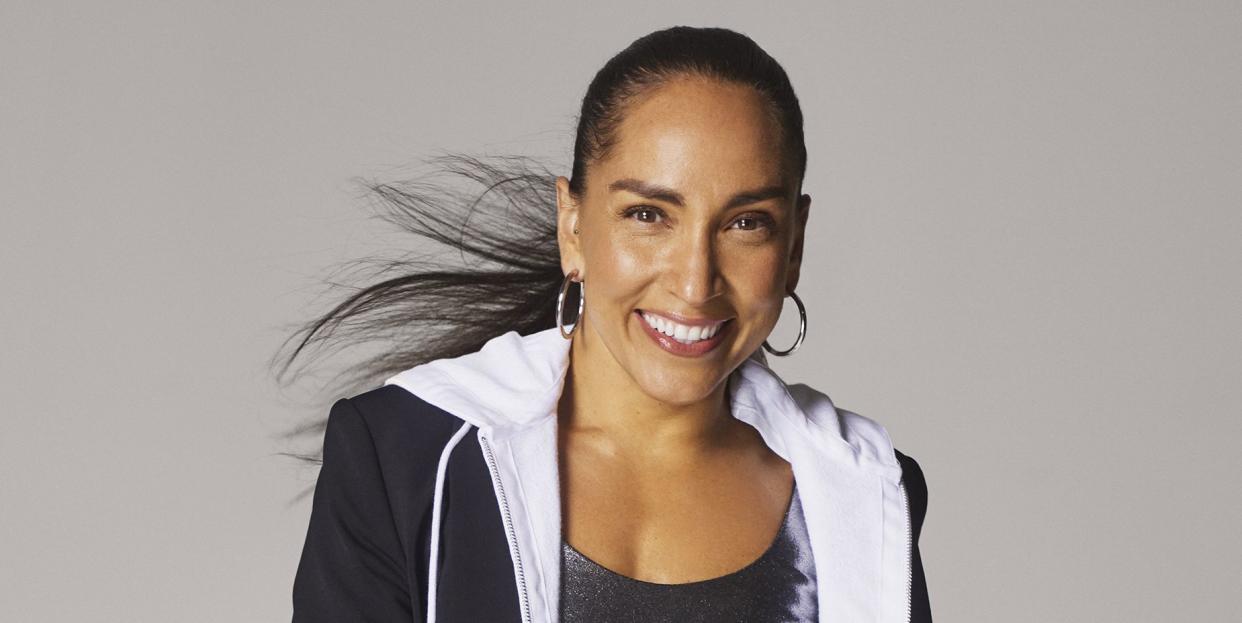
On a recent sunny morning, Robin Arzón hit a major motherhood milestone: Her daughter, Athena, headed off to school for the first time, a language program for a few hours a week. The day began with a Bad Bunny dance party—most days in Robin’s New York City apartment start and end this way, if we’re being honest—and the mood remained electric. Athena, an excited, confident 1½-year-old, walked through the school’s doors and never looked back. Robin and her husband, Drew Butler, beamed. “We were on cloud nine,” Robin says.
As any mom might, Robin posted a series of photos on her Instagram with Athena, pigtailed and jean-jacketed, holding a homemade “first day of school” sign. It’s impossible to tell who looks prouder. The comments began rolling in from Robin’s 1 million followers, an audience that’s grown exponentially alongside her since her days as one of Peloton’s first instructor hires. “Tough day for mama!” they wrote. “So many tears!” “Wow, bittersweet!”
And this doesn’t happen often, but Robin started to question herself. Am I doing this wrong? I didn’t cry! Am I a robot? Did I not do this drop-off moment the right way? Then she snapped out of it. Because if there’s one thing you should know about Robin Arzón, it’s that she always trusts herself in the end. “I was so proud to see this little girl just march right up to the teacher, pull out a book, and sit down,” she says. “I could have interpreted that story as, ‘Oh my God, she doesn’t need me.’ But I don’t need her to. I want her to step into her power.”
If you’ve ever taken one of Robin’s Peloton classes, then you might have heard her say something like this to you too. As the workout behemoth’s vice president of fitness programming, she’s one of the first people to craft the classes that millions sweat to, and one of the last people a new instructor interviews with before they reach your screen. She’s a certified trainer who has been at the forefront of defining what that even means for almost a decade. She’s an ultramarathoner, an entrepreneur, a two-time New York Times bestselling author, and an influencer. But growing up in Philadelphia, she was a book-smart kid who didn’t think about fitness.
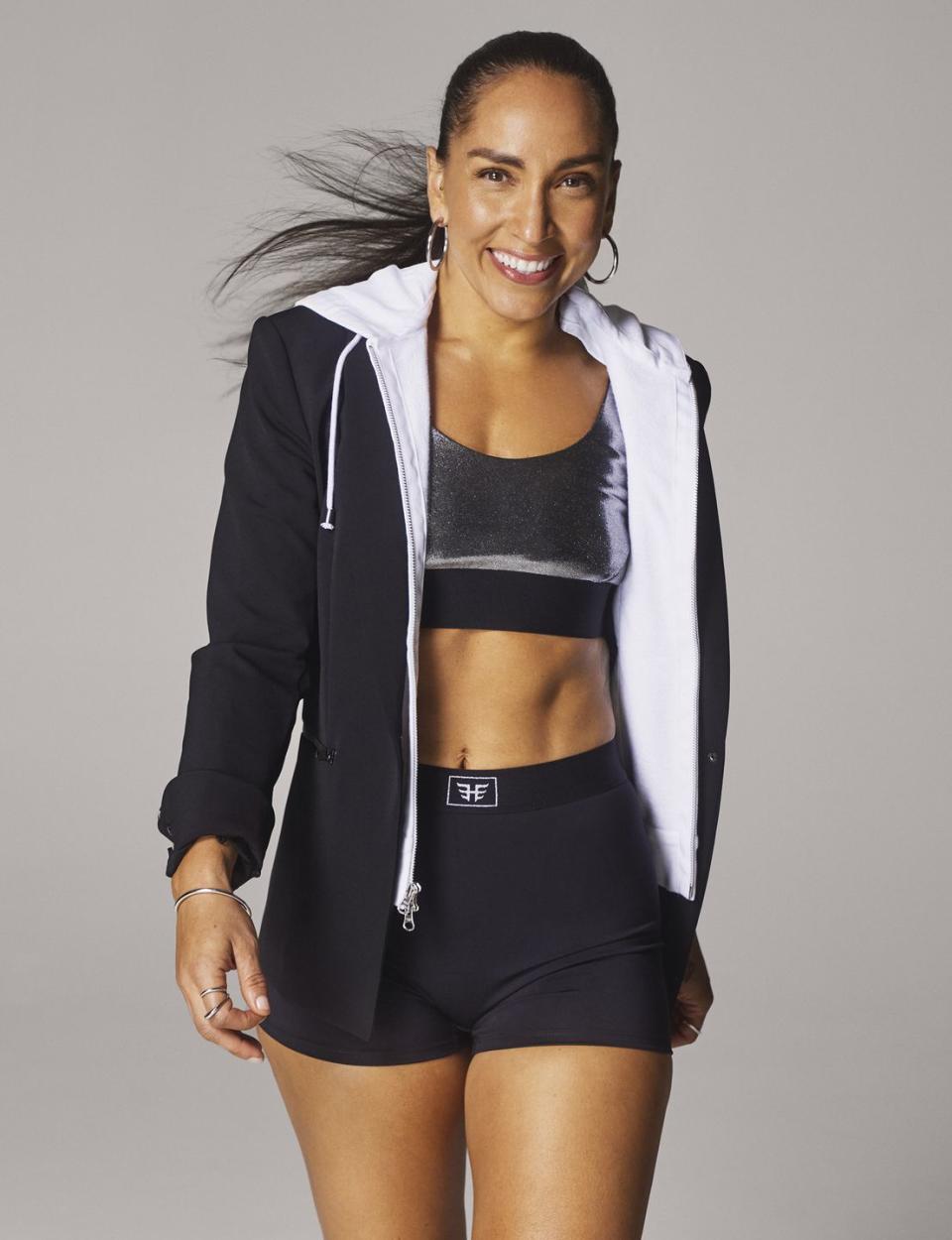
As a child of two immigrants (her mother is from Cuba; her father, Puerto Rico), Robin didn’t see recreational sports as part of her universe. Her mom, a doctor, supported 10 family members. “I was okay being the straight-A student,” she says. “I felt comfortable there.” She rode that comfort to New York University, until a horrifying experience during her senior year uprooted everything.
While she was out with friends at a bar in New York City’s East Village, a man walked in armed with three pistols and a sword and ordered everyone to huddle together in the back. He sprayed them with kerosene, threatening to light them on fire. Robin served as his main line of communication with the outside. Held by her hair, drenched in kerosene, with a gun and a lighter against her head, she tried to talk him out of doing the unthinkable. Eventually, the man was jumped by two patrons and distracted long enough that police could intervene. Robin was physically safe, but mentally, she started to rethink the life she’d built. “One doesn’t have a gun to their head and not have an existential questioning,” she says.
At first, she stuck to the plan, to what made her feel comfortable. She graduated from NYU and started law school at Villanova University. She began therapy. Then one day she glanced at her closet, noticed a pair of sneakers, and decided to head to class on foot. “I think it might have been divine influence,” she recalls. “I have no idea why I did that. But that curiosity changed my life.”
Through the rest of law school and a seven-year stint as an associate at a New York City law firm, running was Robin’s constant. Working up to 80 hours a week, she’d often go for just a 15- or 20-minute run in Central Park in the mornings. “I made the choice to appreciate the process of who I was going to become along the way,” she says. She didn’t realize it then, but running was helping to heal her trauma. In 2010, she ran the New York City Marathon. It was also thanks to running that Robin realized the most impassioned parts of her day were when she was working out. Over a period of two years, she set out to “architect a new life.” She made a meeting on her calendar for 10 minutes every morning, seven days a week, that was nonnegotiable and unmovable. Sometimes she’d spend it journaling, sometimes she’d Google things she wanted to learn about, sometimes she’d just sit there with her own thoughts.
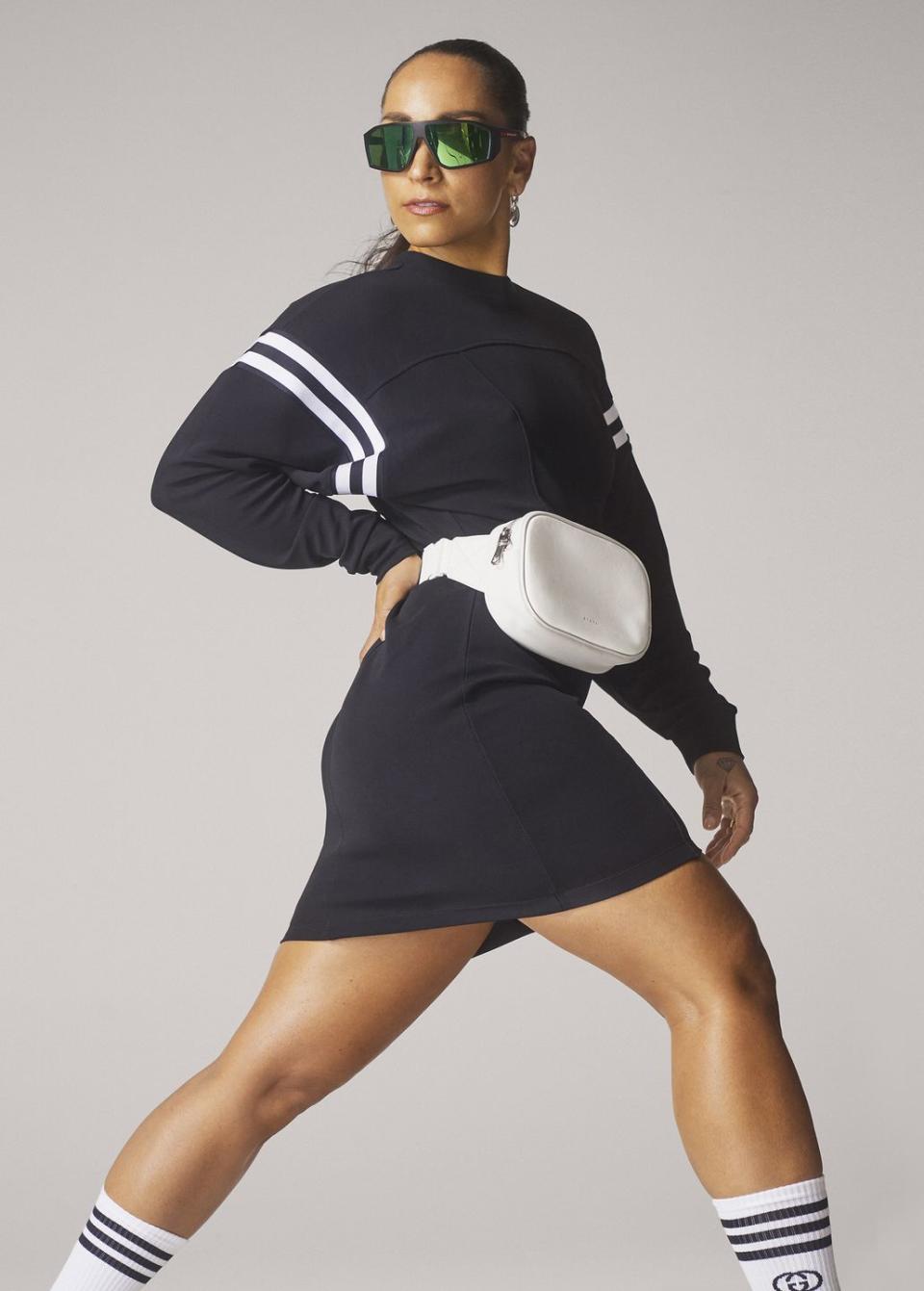
Robin began to realize that her mind was the biggest business asset she had. She’d learned how to light a fire within herself through movement, and she wanted to share that with others. “There wasn’t an a-ha moment” that led her to finally quit her job, she says. “There were thousands of them.”
A stint as a sports journalist, a few marathons and ultramarathons, and an indoor cycling certification later, she was signing with Peloton. At the time, the company occupied a small room in an office building with a makeshift studio of strung-together curtains in one corner. Those first 30 employees “worked our f*cking asses off,” she says, and she claims they knew then that it was the future of fitness. Certainly, they couldn’t have anticipated that the COVID-19 pandemic would make Peloton’s brand indispensable to millions, but they were prepared when it did.
Now, she’s approached on the street daily by members sharing their stories. She worried she’d be late to this interview because she was stopped by two NYPD officers to settle a bet that she was the real Robin Arzón. And she insists that the personality fans see on their screens or in the streets of New York is, in fact, the real her. The stories she tells and the mantras she shares with her classes, which are big enough to fill Madison Square Garden multiple times over, are usually drawn from her morning journal (she never stopped the self-reflection practice). Her husband has taken every class she’s taught, and he laughs at her jokes the same way he does when she’s sitting right next to him.
But motivating millions doesn’t always come easy. The month she started at Peloton, Robin was diagnosed with type 1 diabetes. The first question she asked her endocrinologist was, “What technology is available?” The second: “How am I going to run the ultramarathon I have in three weeks?” Her doctor wasn’t sure she could, or should, but she refused to shut down.
She tried every remedy, and “the learning curve was high,” but she figured it out, like she always does. There were—still are—days when she reverts back to the “mourning period” where she can’t believe what’s happening. But instead of a “woe is me” mentality, she settled on a management and treatment approach that worked for her. And she ran the ultra. “That little bit of friction, I live for,” she says. “It’s within that moment of tension that we have opportunities to shift paradigms and smash ceilings.”
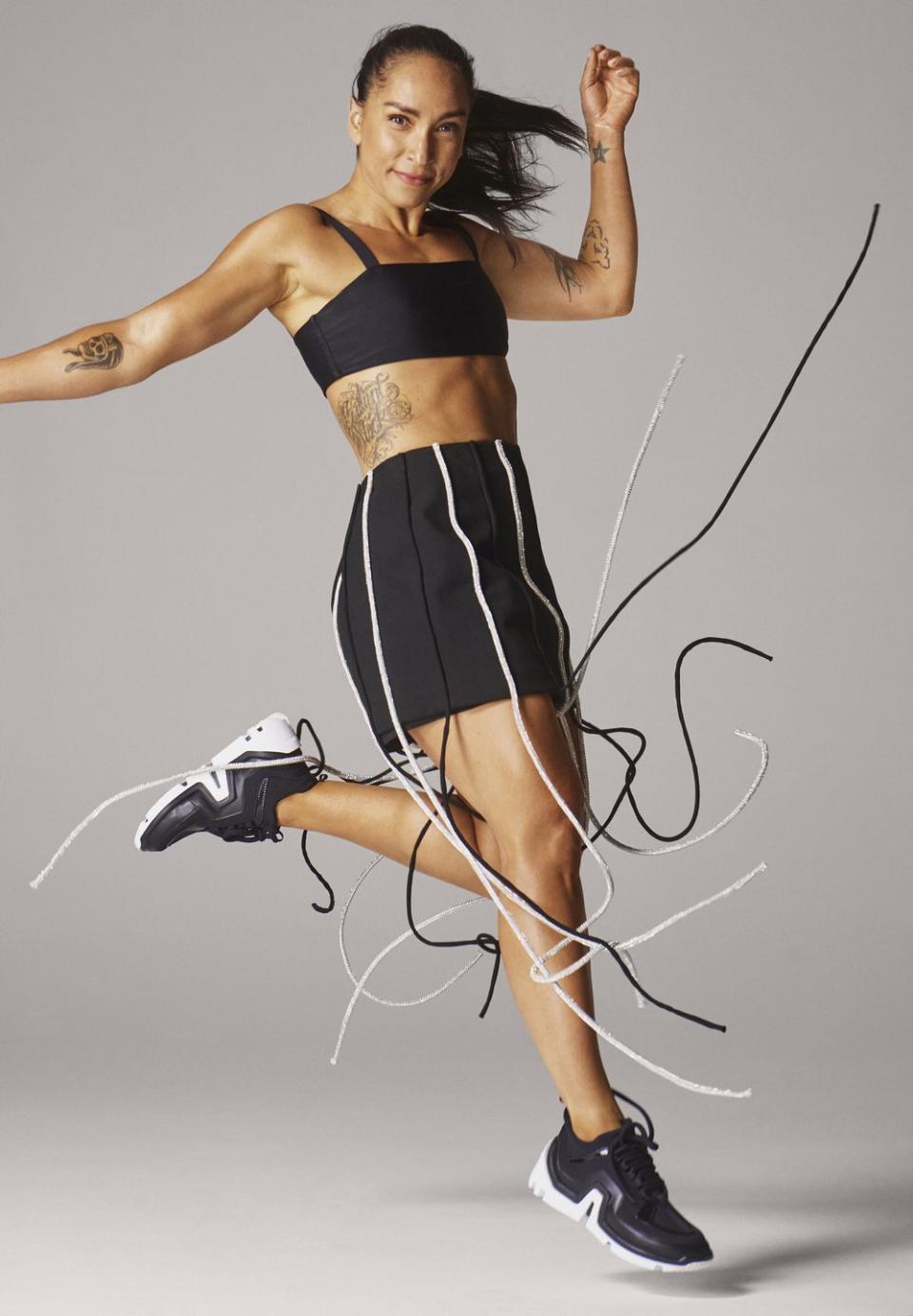
Years later, she and her husband went through the struggle of in-vitro fertilization. When she finally got pregnant—the first Peloton instructor to experience a pregnancy in the public eye—the toxicity that sometimes engulfs the Internet threatened to disrupt her peace. Commenters wondered if she should really be picking up those weights or getting her heart rate so high. “That affected me,” she says. But one of her mottoes is “self-pity is poison.” So she sat with her anger, absorbed it, and from it came something constructive: Peloton’s first pre- and postnatal workout program.
She also gained a valuable lesson. After she gave birth to Athena, she limited her time on Instagram so she could experience her postpartum journey on her terms. In the healing she’s done since the trauma of her 20s, “I realized that pain becomes power, but protecting your peace is actually the ultimate flex,” she says. “I now know how to use that fire in a way that has more nuance.” Robin’s game plan for tackling unexpected challenges is to control what she can, become as educated as possible, and come back to that trust in herself. “We don’t give ourselves enough credit, the ability to start things and figure them out.”
She often turns to her “superhero tool kit,” which at its core is really the basics: hydration, sleep, movement. A daily journaling practice. Time with her husband and her daughter, whom she considers the “anchors” of her life. Her close friendships. Sharing this tool kit with others fills her up, making her mental health ritual a full-circle process. She also thrives when she’s “fueling intentionally.” That means, for her, a vegan diet that she believes has boosted her energy, performance, and recovery. She starts each day with a “monster” 17-ingredient smoothie that includes everything from plant protein to goji berries to chia seeds. Oatmeal keeps her going between workouts. Lunch and dinner are generally a combo of legumes, nuts, tofu, and “every vegetable under the sun.”
Robin also works out before every class she teaches, and it’s almost never a chill yoga or meditation moment—she lifts heavy. Four days a week, she’ll push herself with compound lifts like squats, deadlifts, or chest press. Three days a week, she’ll take a class with one of her colleagues on the Peloton Tread. The 27-time marathoner is not training for a race, for once—which is “much more of a mental challenge than I anticipated”—but she still reserves 20 or 30 minutes to run.
In lieu of a marathon, she’s focusing on external projects. Strong Baby, the follow-up to her bestselling children’s book, Strong Mama, will hit shelves next year. She’s launching a holiday collection with fashion brand GSTQ. She leads a series on MasterClass, is launching a health and wellness NFT community in 2023, and invests in companies like Hyperice, which creates recovery tools, and Happy Viking, Venus Williams’s vegan powders and protein shake company. Robin wants to create a home that empowers her daughter, and she says yes only to things that align with that mission. “My job as a leader of a household and a leader of a movement is to feel at home with myself, then create space for folks around me to feel at home in themselves too.”
It’s a delicate balance between motivating the masses while also motivating herself. “The most important conversation we have is the one with ourselves,” she says. Her own litmus test: Is what she’s saying to herself something she’d say to a friend, or even to a stranger? “I try to turn the inner critic into an inner advocate,” she says. “How can we massage a reaction into a game plan, a pivot, a response? I am charged from challenge, always.”
Make no mistake: “There are so many moments where I feel like I don’t have it figured out,” she says. “But then I remember all the times when I didn’t have it figured out before, and here I am. So who’s to tell me I don’t know enough to make the next best choice?” Robin knows, without a doubt, that to step into her own power, all she needs to do is trust herself.
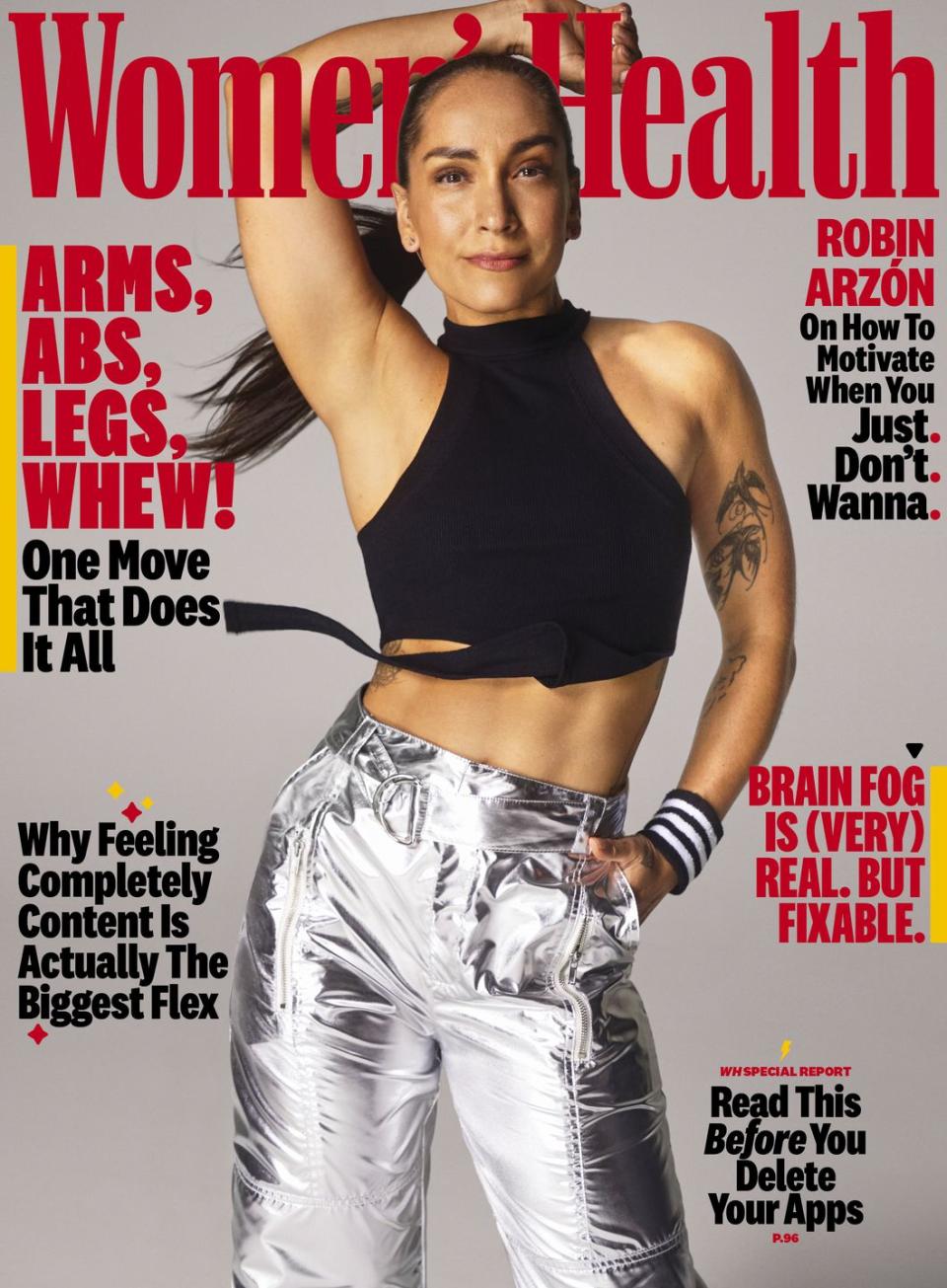
Photographed by Caleb & Gladys; Styled by Kristen Saladino; Hair by Ty Shearn using Oribe hair care at South James Agency. Makeup: Mario for Rebecca. Manicure: Nori for Dior Vernis.
You Might Also Like

